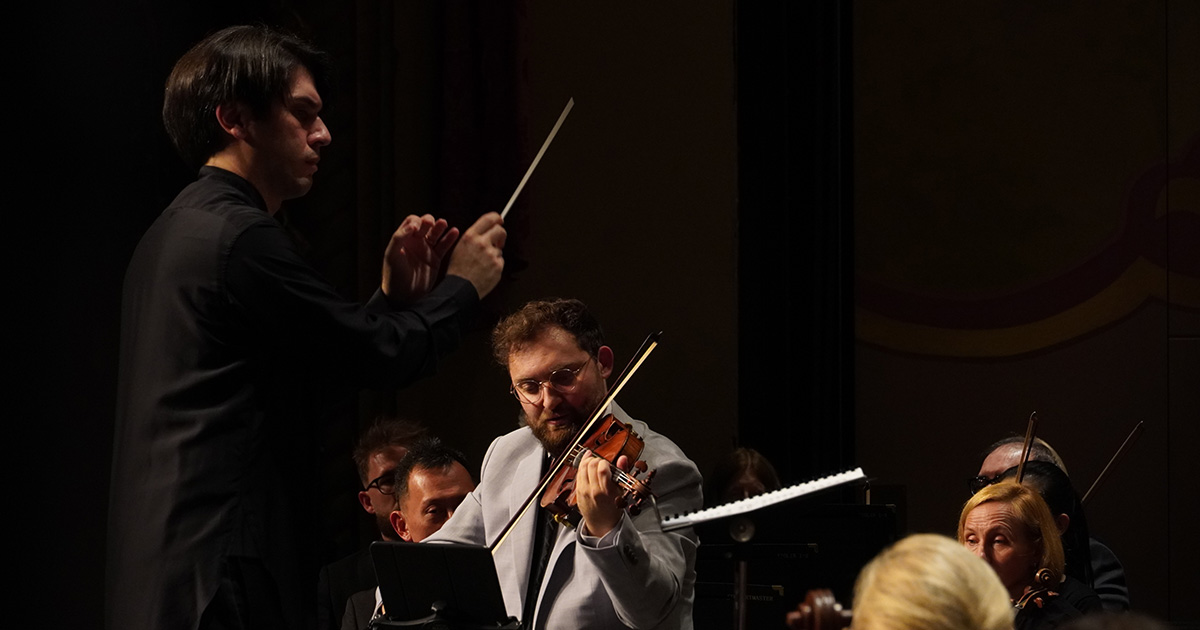In his opening remarks for the audience at the past weekend’s Knoxville Symphony Orchestra concerts, conductor Aram Demirjian offered that one would discover that the program as a showcase of sorts for the orchestra’s players, one chock full of impressive moments for a host of individual musicians. That was certainly the case. But in the bigger picture, this was also a program of five very different works that meshed brilliantly with each other, rewarding the audience both musically and intellectually. Demirjian’s programming included two works by Igor Stravinsky, Firebird Suite and the Violin Concerto. Yet, Stravinsky style did not overwhelm. Somehow, John Williams’ “Hedwig’s Theme,” Debussy’s Prelude to the Afternoon of a Faun, and Lera Auerbach’s Icarus, were deliciously purposeful and appropriate as concern companions.
KSO concertmaster William Shaub was the soloist in the Stravinsky Violin Concerto, giving the audience a clear-eyed insight and a colorful introduction to a work not performed all that often. Although the work’s 1930s neoclassicism can feel a bit rudder-less in its narrative abstraction, Shaub’s style and exemplary technique probably converted more than a few listeners to Stravinsky the storyteller. A bit of drama occurred on Thursday evening’s performance thanks to an unfortunate string break on Shaub’s instrument during an energetic passage. The instantaneous violin exchange with acting concertmaster Gordon Tsai was handled so professionally, it looked routine—barely missing a note. Impressive, too, was Shaub’s painting of the varying stylistic characters of the inner “Aria I” and “Aria II” movements that spring from the “Passport” chord gesture. On the off chance that a listener had drifted into a state of sonic limbo, the conclusion of the final movement “Capriccio” was an energetic and ear-opening ripple in time.

Clearly, Shaub and Demirjian’s familiarity with each other’s performance subtleties and nuances gave the concerto performance an edge of precision that can’t be taken for granted in the usual conductor/guest soloist arrangement.
The featured work of the evening was the Stravinsky Firebird Suite (the 1919 revision), the second and most popular of the three suite versions that the composer adapted from his ballet score for The Firebird, a production of Sergei Diaghilev’s Ballet Russes and Michel Fokine’s choreography. The ballet’s fairytale scenario devised by Fokine was drawn from various Russian folk stories that feature the title Firebird; Kastchei, a legendary monster; a hunter; enchanted woods and magic trees; and the obligatory woodland maidens. This suite features five movements of the most intrinsically interesting dance themes and melodies extracted from the full score with instrumentation adjusted for a more typical concert complement. The work is the perfect example of “post-Romantic” Romanticism in a form that oozes passion and explodes with fire and ice.
Although the performance was a clear demonstration of the passion and ensemble-ness that the KSO has been delivering under Maestro Demirjian, this performance was also the inevitable showcase for KSO sections and individuals. Double bass players rarely get mentioned in concert reviews, but the KSO section (principal Steve Benne) got all of the attention in their soft opening passage that sets up the idea of mystery and menace. Horn solos by Jeffery Whaley were heroic and rapturous. Woodwinds had beautiful moments in the Dances and the more descriptive passages, rendered both whisper soft and elegantly dynamic throughout the evening. KSO leaders include violinist and Associate Concertmaster Gordon Tsai, Principal Flute Devan Jaquez, Principal Oboe Claire Chenette, English horn Jessica Smithorn, Principal Clarinet Gary Sperl, and Principal Bassoon Ryan Yamashiro—all had opportunities in which their particular musical voice made its case or became part of the whole. The Finale’s conclusion was simply one of those musical moments so inspiring that one could simply not resist multiple ovations.
Resting in the shadow of The Firebird, the overwhelmed listener can perhaps be forgiven for forgetting how they arrived at that point. Demirjian and the orchestra had opened with John Williams’ “Hedwig’s Theme” from the Harry Potter films. Brimming with suggestive motifs and rich descriptive color handled by the orchestra with impressive balance, it was a surprisingly perfect lead-in to the Debussy and its magical degree of elegant Impressionism.
In a similar way, Lera Auerbach’s intriguing Icarus was the ideal prelude to The Firebird on the second half. The composer’s program notes states that the title was arrived at after the composition was complete. In this case, the evocation of myths suggests the role of a textural springboard—an attachment that can be fleeting or long-standing.
“All my music is abstract,” Auerbach says, ”but by giving evocative titles I invite the listener to feel free to imagine, to access his own memories, associations. Icarus is what came to my mind, listening to this work at that time.”








